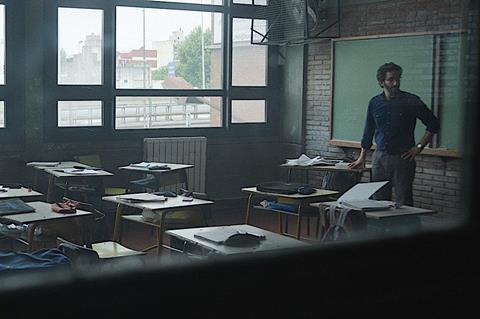A supply teacher struggles to stay on top of his classrom in a tough Buenos Aires barrio in Diego Lerman’s drama

Dir: Diego Lerman. Argentina/Italy/Mexico/Spain. 2022. 110 mins.
In cinema, the story of the committed teacher and the tough inner-city teens never gets old – although it can get clichéd. That’s not the case, though, with Diego Lerman’s Argentinian drama The Substitute, competing in San Sebastian following its Toronto bow. It may not entirely bust this strain of drama wide open, but it’s compelling and steely-minded, mixing Loachian social issue cinema with elements of a gangland thriller, with a thoughtful philosophical undertow and an insightful central character study. Controlled direction from the maker of Suddenly and 2010’s The Invisible Eye, plus a fine central performance from Juan Minujín – with support from prestige art-house names Alfredo Castro and Barbara Lennie – should make apt pupils sit up and pay attention on the festival circuit and in niche platforms.
’The Substitute’ is closer to, say, Laurent Cantet’s ’The Class’ than to the glossy Hollywood affirmation of ’Dangerous Minds’, notwithstanding the faintest echo of the latter.
Minujín plays Lucio, a passionate but somewhat embittered literature scholar with frustrated creative ambitions. He’s first seen on a panel, musing on the value of poetry, alongside Mariela (Lennie), a published poet and his recent ex-wife. While sharing care of their 12-year-old daughter Sol (Renata Lerman), a talented but rebellious budding musician, Lucio accepts a job as a ‘substitute’, or supply teacher, in a tough Buenos Aires barrio where his father Roberto, aka ‘El Chileno’ (Castro) is a committed activist. Despite illness, El Chileno continues to work supporting the deprived local community, but has landed in the middle of a feud between two corrupt politicians – the current mayor and feared drug lord Olmos, ‘El Perro’ , who is standing against him in forthcoming elections.
Awkward, introverted academic Lucio at first seems out of his league trying to get the attention of a classroom of bored youths who are convinced that literature is a waste of time. In one of the film’s few predictable moments, one student proves the whole class wrong by coming out with a dazzling improvised rap. A promising classroom vibe is damaged, however, when local gendarmerie raid the school after drugs are found on the premises – a fix-up involving mayoral rivalries – resulting in student Dilan (Lucas Arrua), a protégé of Roberto, having to go on the run. Meanwhile police presence in the school, and classroom observation by an officious ministry inspector, threaten to damage all that Lucio might achieve.
In its level-headed, politically-conscious directness, The Substitute is closer to, say, Laurent Cantet’s The Class than to the glossy Hollywood affirmation of Dangerous Minds, notwithstanding the faintest echo of the latter. Lerman sketches out his milieu with impeccable attention, from the architecture of the school itself – a modernist fortress, shot by Wojciech Staron with an emphasis on stress-inducing enclosure – to the city’s shanty-town suburbs. It’s only towards the end that the film slightly overplays its hand, with a brief but awkward lurch into action thriller mode that also incongruously ramps up the urban-warzone atmospherics.
Firmly anchoring the film, however, is the portrait of an isolated man whose life has temporarily lost its compass, but who comes to find new purpose as he connects socially, politically and linguistically with the people around him, far from the cultural ivory tower he initially seems to inhabit. Minujín – whose recent high-profile work includes Fernando Meirelles’ The Two Popes and Lucrecia Martel’s Zama – gives a thoughtful performance that’s compelling but unshowy, capturing what’s self-absorbed and neurotic about this hero, as well as his virtues. Alfredo Castro gives a charismatic, level-headed performance that’s miles from the edgy eccentricity he’s often associated with, while Lennie brings wry warmth to a slightly thin role, after her lead in Lerman’s 2017 A Sort of Family. The teenage cast contribute spiky, totally convincing energy, with veteran Rita Cortese getting a juicy role as the school’s no-bullshit principal.
An end credits number by pungently named Argentinian rapper Shitstem caps an ending that’s emotionally satisfying, although Lerman and his co-writers also have the commendable nerve to leave some key narrative threads tantalisingly unresolved. DoP Staron doesn’t often go for the expressionist angle, but when he does – notably in a striking opening shot that establishes Lucio’s isolation – it contributes an angular modernist vitality.
Production companies: Campo Cine, Vivo Film, Pimienta Films, Arcadia Motion Pictures
International sales: Urban Sales, sales@urbangroup.biz
Producers: Nicolás Avruj, Diego Lerman
Screenplay: Diego Lerman, Maria Meira, Luciana de Mello
Cinematography: Wojciech Staron
Production design: Marcelo Chaves
Editing: Alejandro Brodersohn
Music: Jose Villalobos
Main cast: Juan Minujín, Alfredo Castro, Barbara Lennie, Lucas Arrua






![The Brightest SunScreen[Courtesy HKIFF]](https://d1nslcd7m2225b.cloudfront.net/Pictures/274x183/3/5/0/1448350_thebrightestsunscreencourtesyhkiff_312678.jpg)















![The Brightest SunScreen[Courtesy HKIFF]](https://d1nslcd7m2225b.cloudfront.net/Pictures/100x67/3/5/0/1448350_thebrightestsunscreencourtesyhkiff_312678.jpg)

